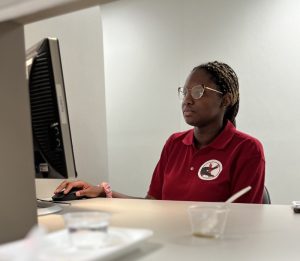 “If you want to create new products, you need to do in-depth consumer research to determine if [consumers] are willing to try a new item or continue with what they are used to.” –Taste X UF Experiential Program student intern Wydlynn Francois
“If you want to create new products, you need to do in-depth consumer research to determine if [consumers] are willing to try a new item or continue with what they are used to.” –Taste X UF Experiential Program student intern Wydlynn Francois
When working toward a goal, there’s no substitute for hands-on learning, especially when taught by experts. This past summer, the Food Science and Human Nutrition (FSHN) Department hosted the newest cohort of Taste of Immokalee (TOI) high school student interns, helping them gain first-hand experience in food product development. Over the three days of the Taste X UF Experiential Program, TOI interns learned from food industry experts about food product development, including food safety standards, nutrition labeling, packaging, market justification, and sensory analysis.
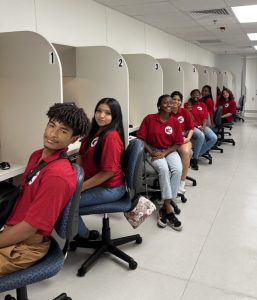
These experts were FSHN faculty as well as other College of Agricultural and Life Sciences (CALS) faculty members and staff from UF’s Florida Fresh Dining Services and the UF/IFAS Agricultural and Biological Engineering (ABE).
What is the Taste of Immokalee (TOI)?
TOI is a program for underserved youth in Immokalee, FL with the mission to “provide students with hands-on experience in all aspects of business, with a focus on social entrepreneurship to give back to the community of Immokalee, Florida”. Through participating in food product development, student interns develop skills to become successful entrepreneurs and business leaders. These products include hot sauces, salsas, and barbeque sauces that are sold across Florida, including in UF campus markets. Interns are involved in each step of the development process, from brainstorming new products to analyzing costs to branding and production.
In collaboration with TOI Sales Development Representative, Myra Jaimes, and FSHN Academic Program Specialist, Chelsea Patrick, this year’s Taste x UF Experiential Program was designed for students to learn about and engage in real food industry processes involved in developing and launching a successful new food product.

Learning About Product Development through the Taste X UF Experiential Program
TOI interns have two new products in the works: a salsa Verde salsa and a salsa Verde-flavored hot sauce. As both are in the early stages of development, the Taste X UF Experiential Program provided an opportunity for the students to practice new skills with tangible products and apply what they learned about food product development in a hypothetical setting.
The interns were split into two groups and tasked with creating a practice product development proposal for the salsa Verde and hot sauce. FSHN faculty and staff led activity sessions on elements of the product development process that the students applied to their product proposal. In addition, faculty from the Agricultural and Biological Engineering department and representatives from Florida Fresh Dining led sessions. On the last day of the program, the interns presented proposals for the salsa Verde and hot sauce to an audience of FSHN faculty and staff and other campus partners.
Understanding Market Justification with Dr. Keith Schneider
A food product may be delicious and appealing, but will consumers buy it? The interns sought to answer this question in FSHN professor Dr. Keith Schneider’s session on the ideation and market justification stages of product development.
Dr. Schneider emphasized the importance of marketing and branding on the success of a food product. To assess whether products should go to market, he posed questions such as:
- How is the product appealing or unique?
- How does it compare to competitors’ products?
- Who is the audience for the product?
- Based on your answers to the questions above, can you justify bringing the product to market?
Later in the session, Dr. Schneider demonstrated how to use AI imaging to create product label prototypes that represent their brand. In the process, the students learned how to visually communicate aspects of the TOI brand like company mission and quality of the products. This session was a highlight for the students, many of whom eagerly engaged with the creative process of label-making.
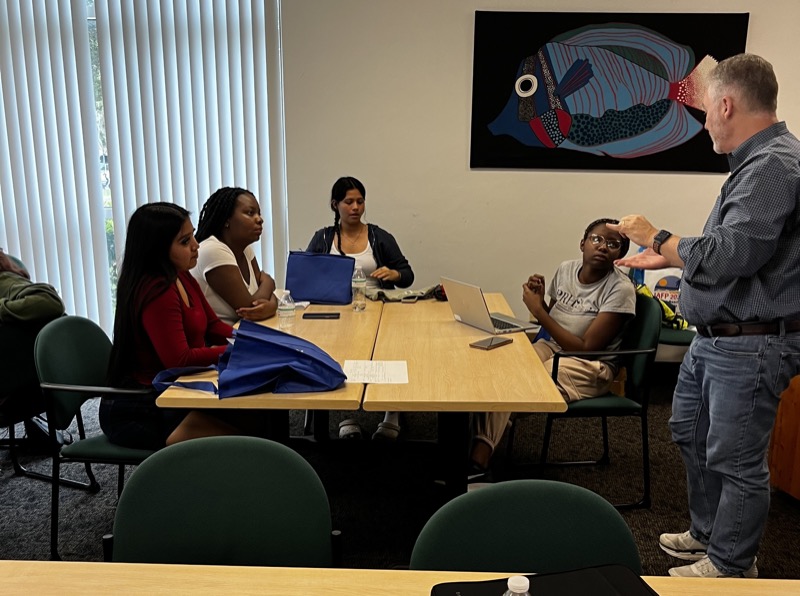
Exploring Retail Placement Analysis with Maddie Kowalewski
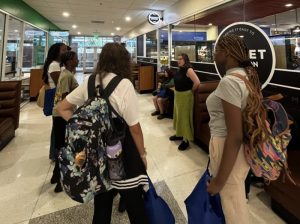
The placement of food products on food shelves is an intentional choice, as the interns learned in their session with Maddie Kowalewski, Sustainability Manager at Florida Fresh Dining. During her tour through the Reitz Union and the Hub, Maddie discussed retail placement analysis: how the placement, position, and branding of products in retail spaces impact consumer choices. As a bonus, the interns got to see current TOI products on the market shelves!
Maddie tasked the students with considering how the placement of their products impacted consumer decision-making. For example, the Reitz Union market displays TOI products on a medium-sized shelf behind the checkout counter, while The Hub market carries their products on a large free-standing shelf in the middle of the store. The interns were shocked to learn that sales of TOI products were higher in the Reitz Union market. But, why?
As Maddie explained, the shelf display behind the checkout counter encourages customers to notice the products in their line of sight. Conversely, customers often bypassed the Hub’s large free-standing shelf. This shelf included non-TOI products, so the TOI products didn’t stand out.
This revelation led to a discussion about the product labels the interns created using AI and the current labels on TOI products. The interns observed how the colors and design of product labels need to capture attention, reinforcing the importance of having a label that not only represents the product but also appeals to consumers.
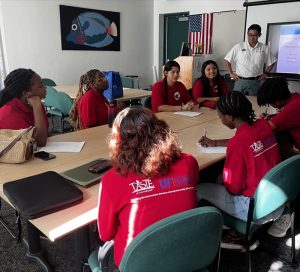
Food Safety in Product Development with Dr. Boce Zhang
Implementing high food safety standards mitigates the biological, chemical, and physical hazards that exist in the production workflow of food products, helping keep consumers safe. In an eye-opening session, FSHN professor Dr. Boce Zhang discussed why food safety is important not only for consumers but for businesses.
Using real examples of food companies that have made unsafe products, Dr. Zhang explained how safety is critical in every stage of product development, from agricultural production, to processing in manufacturing plants and choosing packaging materials. To emphasize this point, he explained the financial costs to food companies when their products hurt consumers.
The knowledge the interns gained in this session supplied context for their recent visit to the co-packing plant that is manufacturing and packaging prototypes for their salsa and hot sauce.
Focusing on Sustainability in the Food Supply Chain with Dr. Ziynet Boz and Spencer Serrano
In their session with the Agricultural & Biological Engineering Department (ABE), the interns met with Dr. Ziynet Boz and graduate student, Spencer Serrano. The interns learned about the circular economy concept within agro-industrial systems, which aims to reduce food waste and avoidable environmental impacts of food supply chains. During their visit to the ABE department, the interns watched a demonstration about training a convolutional neural network to detect water vapor condensation on apples.
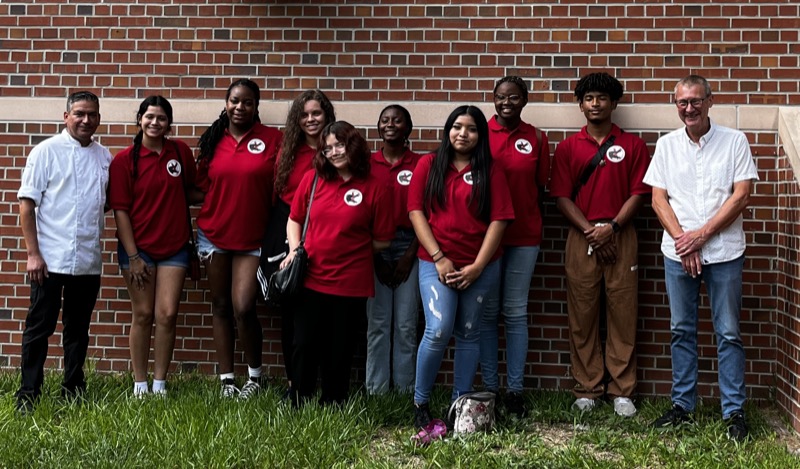
Discovering Sensory Analysis with Dr. Charles Sims and Katlyn Nau
Finally, the interns learned how to incorporate taste tests into their product development process. Under the instruction of FSHN professor Dr. Charles Sims and Sensory Panel Food Scientist Katlyn Nau, they participated in a sensory taste panel where they took a Consumer Acceptability Test for each new product and blind sampled the salsa and hot sauce against their competitors’ products.
The interns tested their TOI products against major competitors, asking the twelve panelists questions such as:
- How often do you consume salsa Verde/hot sauce?
- What spice/heat level do you prefer when consuming salsa Verde/hot sauce?
- How would you describe the intensity of this salsa Verde/hot sauce?
- How would you describe the overall texture of this salsa Verde/hot sauce?
- Which salsa Verde/hot sauce sample do you prefer?
After the tests, Dr. Sims and Katlyn explained how major food companies use taste tests during product development. They also emphasized how the number of participants in this panel was too small to yield reliable results that can influence decision-making, with a typical sensory panel consisting of at least 100 participants to get accurate consumer data and feedback on a product. Yet this mini panel showed the interns the importance of considering consumer feedback when developing products.
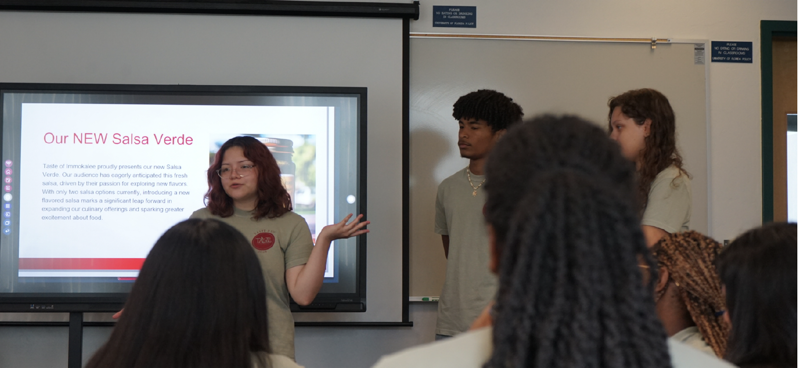
TOI Interns Give Final Presentation Incorporating Knowledge Gained Through Taste X UF
At the end of the program, each intern group gave a product proposal based on what they learned over the past three days. In these presentations, the interns touched on market justification, retail placement analysis, food safety, and sustainability.
Market justification:

Salsa: “Our product stands out with the rich heritage of Taste of Immokalee and will continue to use locally sourced vegetables and fruits, consistent with our existing products. Its appeal lies in its renowned reputation, complemented by eye-catching packaging designed to attract attention. Moreover, our competitive pricing ensures high-quality salsa is accessible at an affordable price.”
Hot sauce: “Our product is unique because we don’t add artificial flavors to our sauces. We are low on sodium and cholesterol and are gluten free. We are also unique because we are student-created [and] student-[run].”
Retail placement analysis: Each group discussed placement preferences for their salsa and hot sauce in Publix grocery stores.
Food safety: Each group determined what type of packaging they would use for their products and how the packaging material would impact the products’ shelf-life, storing instructions, expiration dates, bacteria growth risk and overall safety. Each group described steps they would take to ensure the safe production of their new hot sauce and salsa.
Sustainability: The hot sauce group proposed creating a rewards program that encourages customers to return their empty hot sauce bottles for points and/or money, thereby limiting the amount of product materials wasted while also reducing TOI’s production costs.
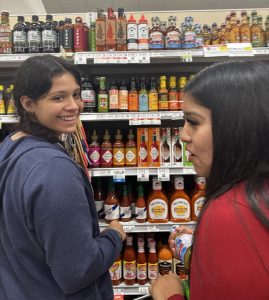
Interns Reflect on Their Experience and Look to the Future
The eight members of this year’s Taste X UF cohort shared positive experiences from the program. According to the interns, visiting the UF campus was an enjoyable and educational experience, with professors and students eager to answer their questions. The hands-on labs and presentations were informative while offering engaging practice in teamwork, entrepreneurship, and product development.
Intern Wydlynn offered a final thought, sharing, ““The trip provided exciting experiences and informative learning opportunities. Overall, it was a 10/10 experience, and all teenagers from our area ought to consider it.”
Taste X UF is a collaboration between Taste of Immokalee and the University of Florida’s Food Science & Human Nutrition Department that aims to teach student interns entrepreneurial skills through innovative food product development. Every year, the students learn new concepts about food industry that they can apply to their Taste of Immokalee products. Read more about the program here, and support these exceptional underserved students by giving here.
Thank you to Chelsea Patrick for spearheading the publication of this article.
 1
1
